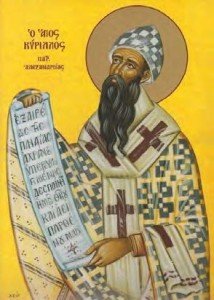Like Cyril, the central inspiration for Athanasius can be expressed in this phrase taken from Paul’s writing: God, who “alone has immortality” is the only Savior from corruption and death. In his polemics against Arius, Athanasius clearly states: only God can save. Similarly, Cyril, engaged in controversy, once proclaimed quite naturally, paraphrasing Isaiah 63:9, that “it is not an elder, nor an angel, but the Lord Himself who saved us, not by an alien death or by the mediation of an ordinary man, but by His very own blood.” If you recall the heresy of Arius and even Nestorius, you can tell that he is directly addressing them.
This recognition of God as the agent of salvation is shown also in the repeated use of the title “Emmanuel” (“which in translation means “God with us”) for Christ, particularly in Cyril’s famous twelve anathemas contained in his third letter to Nestorius. Like Athanasius before him, Cyril could not conceive of the divine love manifested in the incarnation to be really perfect unless it as an act of self-giving of God. “God so loved the world that he gave his only Son” (John 3:16). This implied the personal presence of God in the human reality of Jesus of Nazareth.
The Christological trend that originated in Antioch with Theodore of Mopsuestia and was most only preached by Nestorius was based on the fear that the humanity of Jesus would be totally ignored by the proponents of “deification.” This is why the controversy against Nestorius, undertaken by Cyril with such energy and consistency, was centered on the two most human moments in the Gospel story of Jesus: his birth from Mary and his death on the cross. Although Cyril always recognized that both these moments belong to divine economy in the flesh – that is, that the eternal God by nature could neither be born in history nor die – he considered that the salvation of the world would not have occurred unless it was personally the Son of God who was born of the Virgin, and also personally suffered on the cross “according to the flesh.”
As you will recall, the heresies of both Arius and Nestorius challenged who we believe Jesus to be, namely fully God and fully man. They found it difficult to comprehend how God could have achieved this and, therefore, saw Jesus as either more God than man or more man than God. We believe Jesus to be fully God and fully Man.

